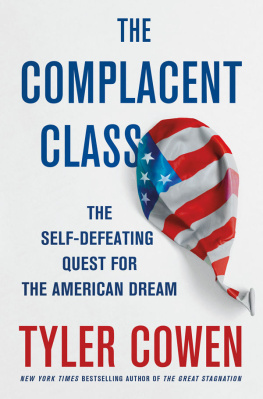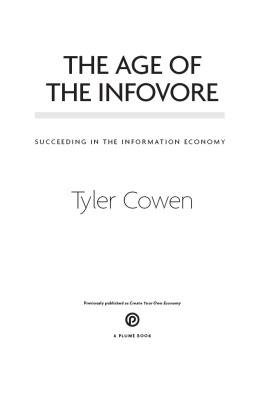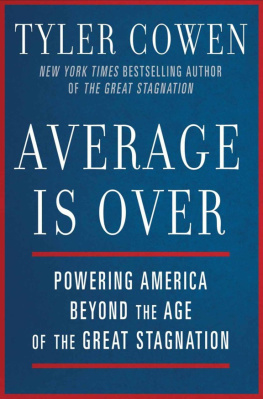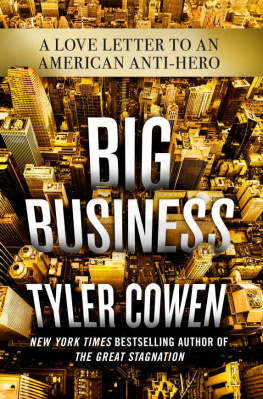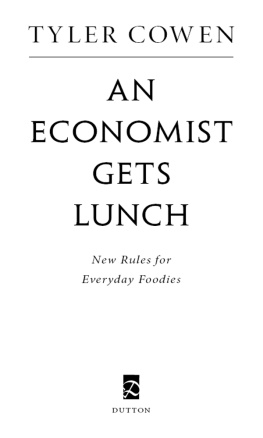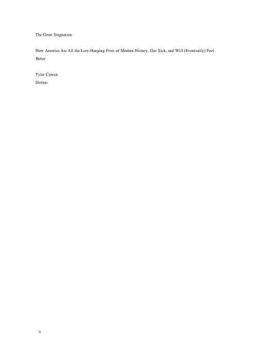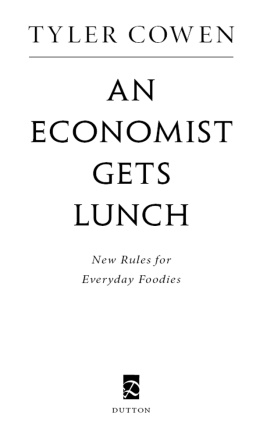
Thank you for buying this
St. Martins Press ebook.
To receive special offers, bonus content,
and info on new releases and other great reads,
sign up for our newsletters.

Or visit us online at
us.macmillan.com/newslettersignup
For email updates on the author, click here.
The author and publisher have provided this e-book to you for your personal use only. You may not make this e-book publicly available in any way. Copyright infringement is against the law. If you believe the copy of this e-book you are reading infringes on the authors copyright, please notify the publisher at: us.macmillanusa.com/piracy.
To the rebel in each of us
For useful comments, edits, and discussion, the author would like to thank most of all Tim Bartlett and Michael Rosenwald and Teresa Hartnett, but also Bryan Caplan, Yana Chernyak, Carrie Conko, Natasha Cowen, Michelle Dawson, Veronique de Rugy, Jason Fichtner, David Gordon, Kevin and Robin Grier, Robin Hanson, Garett Jones, Daniel Klein, Randall Kroszner, Edward Luce, Megan McArdle, Stephen Morrow, John Nye, Jim Olds, Hollis Robbins, Daniel Rothschild, Reihan Salam, Alex Tabarrok, Peter Thiel, and surely some number of others whom I have neglected or forgotten unjustly.
Disruption has been the buzzword of the decade. And its true that there have been some significant changes afoot, from the wiring of the whole world to the coming of unprecedented levels of multiculturalism and tolerance. But as important and yet neglected is a story thats happening alongside and to some degree in reaction to all of that change. It involves people making decisions that are at first glance in their best intereststhat is, they are economically and indeed socially rational decisions. But the effects of these decisions at the societal level are significant, unintended, and not always good. They have made us more risk averse and more set in our ways, more segregated, and they have sapped us of the pioneer spirit that made America the worlds most productive and innovative economy. Furthermore, all this has happened at a time when we may need American dynamism more than ever before.
Americans are in fact working much harder than before to postpone change, or to avoid it altogether, and that is true whether were talking about corporate competition, changing residences or jobs, or building things. In an age when it is easier than ever before to dig in, the psychological resistance to change has become progressively stronger. On top of that, information technology, for all the disruption it has wrought, allows us to organize more effectively to confront things that are new or different, in a manageable and comfortable way, and sometimes to keep them at bay altogether.
Given the growing success of the forces for stasis, I see complacency a general sense of satisfaction with the status quoas an increasingly prominent phenomenon in American life. And Ive coined the phrase the complacent class to describe the growing number of people in our society who accept, welcome, or even enforce a resistance to things new, different, or challenging. These people might in the abstract like some things to change, they might even consider themselves progressive or even radical politically, but in fact they have lost the capacity to imagine or embrace a world where things do change rapidly for most if not all people.
This movement and this Zeitgeist have now become so pervasive that we could even speak of the complacent classes , but when I stick with the singular form, it will be to emphasize the underlying unities behind differing situations. Consider, for instance, three tiers of the complacent class, differing in terms of income and education and opportunity.
1. The Privileged Class.
Members of the privileged class are usually well educated, often influential, and typically stand among the countrys higher earners, though not always in the top 1 percent (which starts at around $400,000 a year). They correctly believe their lives are very good, and they want things to stay that way awhile, of course wishing to elevate as many others as possible. These individuals tend to be tolerant, liberal in the broad sense of that word, and often quite munificent and generous. They fit the standard description of cosmopolitan and usually take an interest in the cultures of other countries, though, ironically, many of them have become sufficiently insulated from hardship and painful change that they are provincial in their own way and have become somewhat of a political target (from both Donald Trump and Bernie Sanders in the recent campaigns). Because they are intelligent, articulate, and often socially graceful, they usually seem like very nice people, and often they are. Think of a financier or lawyer who vacations in France or Italy, has wonderful kids, and donates generously to his or her alma mater. I think of these people as the wealthiest and best educated 3 to 5 percent of the American population.
2. Those Who Dig In.
The individuals who dig in are more likely to be of middling station when it comes to income and education. They are not at the top of their professions for the most part, and they may have professional jobs, such as being dentists, or nonprofessional jobs, such as owning small businesses. Still, by either global or historical standards their lives are nonetheless remarkably good, and full of first-world problems. Many of them are doing better than what we think of as a typical middle-class existence. But because they hold a lot of their wealth in the form of their homes, and in some cases have legitimate worries about their long-term employment, they do not have the luxury of not worrying about money. Further, pressures from the costs of housing, health care, and education intensify the money issue for them, and they do have to worry about financing retirement. They hope to hang on to what is a pretty decent life, whatever its stresses and imperfections may be. Think of a midlevel teacher or health care worker who is trying to keep the neighborhood in good shape, get the kids into a better college, and save something for a still-uncertain future, all contemporary methods of trying to dig in.
3. Those Who Get Stuck.
Those who get stuck are the individuals who, among other combinations of possibilities, may have grown up in highly segregated neighborhoods, received a subpar education, were exposed to significant environmental toxins like lead paint, have parents who drank in excess or abused opiates, were abused as children, became alcoholics or drug abusers themselves, or perhaps ended up in jail. Their pasts, presents, and futures are pretty bad, and they are not happy about their situations. A lot of these people never really had a fair chance. Think of a single mom with a poorly paid retail job and no college degree, or the ex-con who has dropped out of the labor force because he cant find a decent job and is now trying to get on disability.
Despite the divergences in their situations, what these groups have in common is a certain level of social and emotional and indeed ideological acceptancea presuppositionof slower change. More and more, America consists of people who belong to one of these three groups and are more or less OK with this division of the spoils.
You might think the group at the bottom cannot possibly be complacent about their situation, but by standards of recent history, indeed they have been when it comes to their actual behavior. As well see later, the numbers show this pretty clearly. They have been committing much less crime, engaging in much less social unrest, and embracing extreme ideologies such as communism to a smaller degree; if anything, they have been more disillusioned than politically engaged. Ill consider later in the book whether the Ferguson riots and the election of Donald Trump and other unusual current events might be signaling an end to this trend, but the point is that we have been building toward stasis for about the last forty years. Whether or not you think the break point has come just now, to understand why the stasis eventually must fall apart, first we must see how and why it has evolved.
Next page
